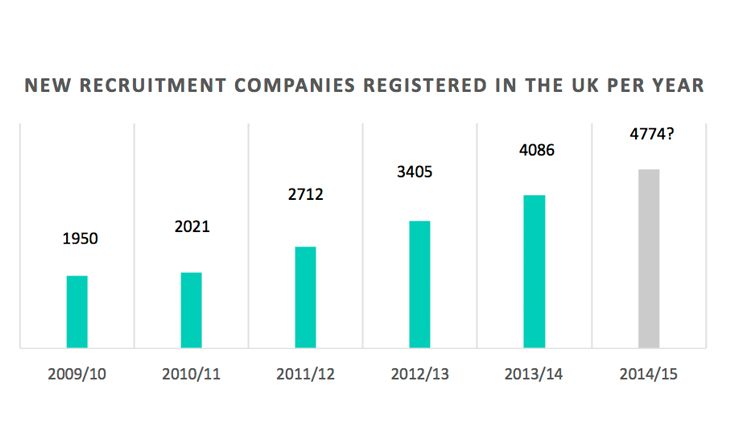 Amy Golding - Founder of Recruitment Entrepreneur
Amy Golding - Founder of Recruitment EntrepreneurDespite the difficulties with growing your own recruitment business I discussed in last month’s column, now the market is improving, the rate at which people are setting up is growing even faster. According to Sonovate and Companies House, over 4,000 NEW recruitment companies were registered in the UK in 2013/14. If you are starting your own recruitment business this year, you could be one of 4,774 people with the same idea.
However, if rather than putting you off, that brought out the competitive beast in you, here is 5 things to pause and think about just before you take the plunge….
- Why are you doing this…?!
Many people think, after a few successful years in recruitment, that all there is to it is clients and candidates. That’s why today in the UK there are over 18,000 recruitment businesses with less than 4 people in them. Is your sole reason for doing this that you want to keep more of the fees you make? Consider how much harder it is to do deals without a database, and think about the ‘what next?’ A year of working out of your bedroom might feel like a sabbatical, but you could soon be feeling bored, lonely, stuck in a rut and that you can’t see a way out of picking up the phone to earn a living.
However, if you are doing it because you want to build a proper business, a market leader, with a growing staff base and respected brand name, then make sure you have really considered all the things it will take to go into that before you jump ship. There’s a lot of other people splashing around out there, and not many lifeboats!
Attention Recruiters
See Live Jobs on SplitFee.org – Don’t Miss Out
It’s FREE if you Join Now!
- Clients & Candidates…
Yes, building a recruitment business isn’t ALL about clients and candidates…. But they are pretty important! Be clear on your restrictive covenants before you do any work on your own venture. Companies have been known to check employees phone registers, texts, screen shots, emails, linked in messages, even printer activity to make sure they haven’t taken information with them. We have known would-be Entrepreneurs be served injunctions before they’ve even picked up the phone. This involves not only a hefty legal bill, but can also lock you out of your market for 12 months or more. If you have strong restrictive covenants, be confident that you can spend that period either working in a new market, or doing lots of business development with new clients and candidates. If you take on the challenge and see it as a good opportunity – once restrictions are up you will find yourself in a much better place anyway than once you’ve reached the end of your current contact list.
- Cash is king!
Be very, very clear that you have at least enough cash to last until your first deals start coming in. Many people approach us for funding after initially underestimating how much it costs to get up and running, and then to actually grow the business, not just maintain themselves. Through the rose tinted glasses of planning world domination (before your P60 has come through the door), it’s easy to thinking about winning business, and easy to forget about cash flow. You might think (reasonably) that with a bit of hard graft, you could place your first candidate in 2 months. However, what does that actually mean in terms of cash flow?
- 2 months to make a placement
- Candidate notice periods can be up to 3 months
- So 5 months before you send the first invoice with payments terms often a minimum of 30 days from the end of the next month
- So that’s 7 months supporting yourself as well as the costs incurred setting up a database, IT, job boards, Linked In accounts. That’s before you’ve even thought about hiring
- For temp businesses you also have the costs of pay rolling contractors to factor in
Just make sure you are absolutely ready for the cash commitment before you start. You don’t want to have to give up on a business that is actually going well and showing promise, because of bad cash planning.
- Office space
One of the biggest cash drains can be office space. Working from home seems like a great way to save money up front – but if you are going to start small, you need to be prepared for how long it will take to go from having a ‘lifestyle business’ to the kind of company you imagine yourself running. From a personal perspective not getting up, donning a suit and travelling to the office every day can be emotionally difficult. Once the honeymoon period of being able to make calls in your pants and take job specs in the bath wears off, it can actually be a pretty disheartening experience not being able to delineate work and home, not to mention having to be creative when it comes to client and candidate meetings. It’s amazing how quickly you can become lazy and distracted when the latest Game of Thrones episode is only a click away and no one cares what time you come in. Start as you mean to go on, and if you want to build a big business it may be worth making sure you have the funds to do it properly from day one so you don’t slip into your comfort zone and forget why it is you left your job in the first place. You don’t want to be 6 months in and still trying to high five the goldfish every time you make a placement.
And of course…. If you’re trying to build a proper business, this will succeed or fail on your ability to hire for yourself. A city centre, buzzing office environment makes this a hell of a lot easier…..
- Talent Attraction
Which leads me to the final of my 5 points…. Talent attraction. New business owners always underestimate how challenging hiring for yourself is. Your competing for the best talent with 18,000 other start ups as well as the established businesses out there. Not only do they have to buy into you and your vision, you also need the money to pay good people. If you start off hiring trainees, the time spent finding, hiring, training, motivating, incentivising, performance managing and rewarding them takes up so much time and effort for a young business. But hiring one or two wrong experienced people that don’t work out has been the downfall of thousands of struggling start-up owners we have met. Make sure you have your talent strategy planned before you start, and if you can, start having preliminary coffees with people you know in the market. If you know you are starting on day one with people in the pipeline, your in a much better position to start hiring as soon as you can.
For more information or guidance about starting your own recruitment business, visit Recruitmententrepreneur.com









